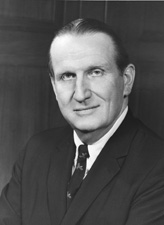James Allen (U.S. senator)
| James Allen | |
|---|---|
 |
|
|
United States Senator from Alabama |
|
|
In office January 3, 1969 – June 1, 1978 |
|
| Preceded by | J. Lister Hill |
| Succeeded by | Maryon Pittman Allen |
| 17th Lieutenant Governor of Alabama | |
|
In office January 15, 1951 – January 17, 1955 |
|
| Governor | Gordon Persons |
| Preceded by | James C. Inzer |
| Succeeded by | William G. Hardwick |
| 20th Lieutenant Governor of Alabama | |
|
In office January 14, 1963 – January 16, 1967 |
|
| Governor | George Wallace |
| Preceded by | Albert B. Boutwell |
| Succeeded by | Albert Brewer |
| Member of the Alabama Senate | |
|
In office 1946–1950 |
|
| Member of the Alabama House of Representatives | |
|
In office 1938–1942 |
|
| Personal details | |
| Born |
James Browning Allen December 28, 1912 Gadsden, Etowah County Alabama, US |
| Died | June 1, 1978 (aged 65) Gulf Shores, Alabama |
| Resting place | Forrest Cemetery in Gadsden, Alabama |
| Nationality | American |
| Political party | Democratic |
| Spouse(s) |
(1) Marjorie Stephens (her death) |
| Alma mater | University of Alabama School of Law |
| Religion | Church of Christ |
| Military service | |
| Allegiance |
|
| Service/branch |
|
| Years of service | 1943–1946 |
| Unit | Reserves |
(1) Marjorie Stephens (her death)
James Browning Allen (December 28, 1912 – June 1, 1978) was a Democratic U.S. Senator from Gadsden, Alabama.
The Gadsden native attended the University of Alabama and the University of Alabama School of Law, both located in Tuscaloosa. At the University of Alabama he was a member of Alpha Sigma Phi. He practiced law in Gadsden from 1935 to 1968 and was a member of the Alabama House of Representatives from 1938 to 1942. He resigned from the state legislature to enter active duty in the United States Naval Reserve from 1943 to 1946. He again ran for office after World War II and was a member of the Alabama Senate from 1946 to 1950. He was the 17th and 20th Lieutenant Governor of Alabama from 1951 to 1955 and again from 1963 to 1967.
In 1968, Allen was elected to succeed the retiring Democratic U.S. Senator J. Lister Hill of Montgomery. Allen won 638,774 (76 percent) to 201,227 (24 percent) for his Republican opponent, Perry O. Hooper, Sr.
Like his Republican Senate colleague, Jesse Helms of North Carolina, Allen was a master of parliamentary procedure. He was considered to have revived the filibuster rule during his nearly nine years as a senator. Allen was known as one of the most conservative Democrats in the chamber, more conservative even than many Republicans at that time. He was an active opponent of the Panama Canal Treaty of 1978. Allen received one vote for the Republican vice-presidential nomination at the 1976 Republican National Convention.
...
Wikipedia
